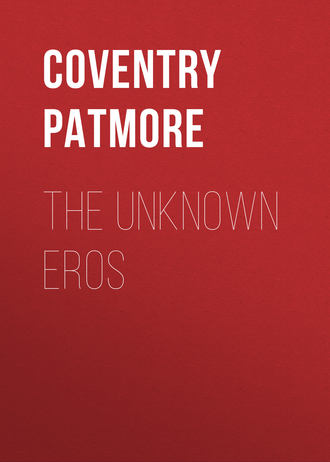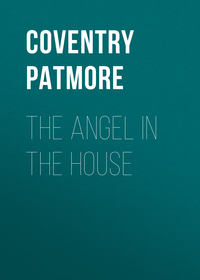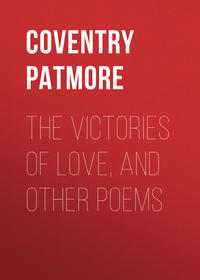The Unknown Eros
 полная версия
полная версияThe Unknown Eros
Жанр: зарубежная поэзиязарубежная классиказарубежная старинная литературастихи и поэзиялитература 19 векасерьезное чтениеcтихи, поэзия
Язык: Английский
Год издания: 2018
Добавлена:
Настройки чтения
Размер шрифта
Высота строк
Поля
L’ALLEGRO
Felicity!Who ope’st to none that knocks, yet, laughing weak,Yield’st all to Love that will not seek,And who, though won, wilt droop and die,Unless wide doors bespeak thee free,How safe’s the bond of thee and me,Since thee I cherish and defy!Is’t Love or Friendship, Dearest, we obey?Ah, thou art young, and I am gray;But happy man is he who knowsHow well time goes,With no unkind intruder by,Between such friends as thou and I!’Twould wrong thy favour, Sweet, were I to say,’Tis best by far,When best things are not possible,To make the best of those that are;For, though it be not May,Sure, few delights of Spring excelThe beauty of this mild September day!So with me walk,And view the dreaming field and bossy Autumn wood,And how in humble russet goesThe Spouse of Honour, fair Repose,Far from a world whence love is fledAnd truth is dying because joy is dead;And, if we hear the roaring wheelOf God’s remoter service, public zeal,Let us to stiller place retireAnd glad admireHow, near Him, sounds of working ceaseIn little fervour and much peace;And let us talkOf holy things in happy mood,Learnt of thy blest twin-sister, Certitude;Or let’s about our neighbours chat,Well praising this, less praising that,And judging outer strangers byThose gentle and unsanction’d linesTo which remorse of equityOf old hath moved the School divines.Or linger where this willow bends,And let us, till the melody be caught,Harken that sudden, singing thought,On which unguess’d increase to life perchance depends.He ne’er hears twice the same who hearsThe songs of heaven’s unanimous spheres,And this may be the song to make, at last, amendsFor many sighs and boons in vain long sought!Now, careless, let us stray, or stopTo see the partridge from the covey drop,Or, while the evening air’s like yellow wine,From the pure stream take outThe playful trout,That jerks with rasping check the struggled line;Or to the Farm, where, high on trampled stacks,The labourers stir themselves amainTo feed with hasty sheaves of grainThe deaf’ning engine’s boisterous maw,And snatch again,From to-and-fro tormenting racks,The toss’d and hustled straw;Whilst others tend the shedded wheatThat fills yon row of shuddering sacks,Or shift them quick, and bind them neat,And dogs and boys with sticksWait, murderous, for the rats that leave the ruin’d ricks;And, all the bags being fill’d and rank’d fivefold, they pourThe treasure on the barn’s clean floor,And take them back for more,Until the whole bared harvest beauteous liesUnder our pleased and prosperous eyes.Then let us give our idlest hourTo the world’s wisdom and its power;Hear famous Golden-Tongue refuseTo gander sauce that’s good for goose,Or the great Clever Party conHow many grains of sifted sand,Heap’d, make a likely house to stand,How many fools one Solomon.Science, beyond all other lustEndow’d with appetite for dust,We glance at where it grunts, well-sty’d,And pass upon the other side.Pass also by, in pensive mood,Taught by thy kind twin-sister, Certitude,Yon puzzled crowd, whose tired intentHunts like a pack without a scent.And now come home,Where none of our mild daysCan fail, though simple, to confessThe magic of mysteriousness;For there ’bide charming Wonders three,Besides, Sweet, thee,To comprehend whose commonest ways,Ev’n could that be,Were coward’s ’vantage and no true man’s praise.REGINA COELI
Say, did his sisters wonder what could Joseph seeIn a mild, silent little Maid like thee?And was it awful, in that narrow house,With God for Babe and Spouse?Nay, like thy simple, female sort, each oneApt to find Him in Husband and in Son,Nothing to thee came strange in this.Thy wonder was but wondrous bliss:Wondrous, for, thoughTrue Virgin lives not but does know,(Howbeit none ever yet confess’d,)That God lies really in her breast,Of thine He made His special nest!And soAll mothers worship little feet,And kiss the very ground they’ve trod;But, ah, thy little Baby sweetWho was indeed thy God!THE OPEN SECRET
The Heavens repeat no other Song,And, plainly or in parable,The Angels trust, in each man’s tongue,The Treasure’s safety to its size.In shameful HellThe Lily in last corruption lies,Where known ’tis, rotten-lily-wise,By the strange foulness of the smell.Earth, that, in this arcanum, spiesProof of high kinship unconceiv’d,By all desired and disbeliev’d,Shews fancies, in each thing that is,Which nothing mean, not meaning this,Yea, does from her own law, to hint it, err,As ’twere a trust too huge for her.Maiden and Youth pipe wondrous clearThe tune they are the last to hear.’Tis the strange gem in Pleasure’s cup.Physician and Philosopher,In search of acorns, plough it up,But count it nothing ’mong their gains;Nay, call it pearl, they’d answer, ‘Lo,Blest Land where pearls as large as pumpkins grow!’And would not even rend you for your pains.To tell men truth, yet keep them darkAnd shooting still beside the mark,God, as in jest, gave to their wish,The Sign of Jonah and the Fish.’Tis the name new, on the white stone,To none but them that have it known;And even these can scarce believe, but cry,‘When turn’d was Sion’s captivity,Then were we, yea, and yet we seemLike them that dream!’In Spirit ’tis a punctual rayOf peace that sheds more light than day;In Will and Mind’Tis the easy path so hard to find;In Heart, a pain not to be told,Were words mere honey, milk, and gold;I’ the Body ’tis the bag of the bee;In all, the present, thousandfold amendsMade to the sad, astonish’d lifeOf him that leaves house, child, and wife,And on God’s ’hest, almost despairing, wends,As little guessing as the herdWhat a strange Phoenix of a birdBuilds in this tree,But only intending all that He intends. To this, the Life of them that live,If God would not, thus far, give tongue,Ah, why did He his secret giveTo one that has the gift of song?But all He does He doubtless means,And, if the Mystery that smites Prophets dumbHere, to the grace-couch’d eyes of some,Shapes to its living face the clinging shroud,Perchance the Skies grow tired of screens,And ’tis His Advent in the Cloud.VENUS AND DEATH
With fetters gold her captivated feetLay, sunny sweet;In that palm was the poppy, Sleep; in thisThe apple, Bliss;Against the mild side of his Spouse and MotherOne small God throve, and in’t, meseem’d, another.By these a Death-in-Life did foully breatheOut of a face that was one grate of teeth.Lift, O kind Angels, lift her eyelids loth,Lest he devour her and her Godlets both!MIGNONNE
Whate’er thou dost thou’rt dear.Uncertain troubles sanctifyThat magic well-spring of the willing tear,Thine eye.Thy jealous fear,With not the rustle of a rival near;Thy careless disregard of allMy tenderest care;Thy dumb despairWhen thy keen wit my worship may construeInto contempt of thy divinity;They please me too!But should it once befallThese accidental charms to disappear,Leaving withalThy sometime self the same throughout the year,So glowing, grave and shy,Kind, talkative and dearAs now thou sitt’st to plyThe fireside tuneOf that neat engine deft at which thou sew’stWith fingers mild and foot like the new moon,O, then what cross of any further fateCould my content abate?Forget, then, (but I knowThou canst not so,)Thy customs of some praediluvian state.I am no Bullfinch, fair my Butterfly,That thou should’st tryThose zigzag courses, in the welkin clear;Nor cruel Boy that, fledd’st thou straightOr paused, mayhapMight catch thee, for thy colours, with his cap.ALEXANDER AND LYCON
‘What, no crown won,These two whole years,By man of fortitude beyond his peers,In Thrace or Macedon?’ ‘No, none.But what deep trouble does my Lycon feel,And hide ’neath chat about the commonweal?’ ‘Glaucé but now the third time did againThe thing which I forbade. I had to box her ears.’Twas ill to see her both blue eyesSettled in tearsDespairing on the skies,And the poor lip all pucker’d into pain;Yet, for her sake, from kisses to refrain!’ ‘Ho, Timocles, take downThat crown.No, not that common one for blood with extreme valour spilt,But yonder, with the berries gilt.’Tis, Lycon, thy just meed.To inflict unmovedAnd firm to bear the woes of the BelovedIs fortitude indeed.’SEMELE
No praise to me!My joy ’twas to be nothing but the glassThro’ which the general boon of Heaven should pass,To focus upon thee.Nor is’t thy blameThou first should’st glow, and, after, fade i’ the flame.It takes more mightThan God has given thee, Dear, so long to feel delight.Shall I, alas,Reproach thee with thy change and my regret?Blind fumblers that we beAbout the portals of felicity!The wind of words would scatter, tears would washQuite out the little heatBeneath the silent and chill-seeming ash,Perchance, still slumbering sweet.1
In this year the middle and upper classes were disfranchised by Mr. Disraeli’s Government, and the final destruction of the liberties of England by the Act of 1884 rendered inevitable.
2
The Alabama Treaty.
3
This Piece was written in the year 1874, soon after the publication of an incendiary pamphlet by Mr. Gladstone against the English Catholics, occasioned by the Vatican Council.



